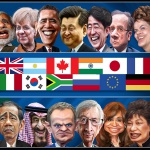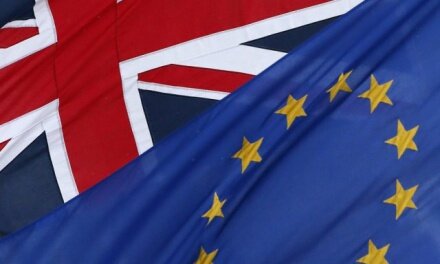
Brexit is not just about Britain when the outside forces weigh in
The vote set to take place on the 23 June has been cited as the most important vote that Britons have had to make in a generation. Do we protect British jobs and retain markets for British produce or do we take back full control of our British borders and make sure all political decisions are made in Britain and not in Brussels will be decided. This isn’t solely a British based issue though; global influences will greatly affect the way the UK votes this summer.
The obvious international factor influencing British voters is the migrant crisis that has unfolded across Europe since the outbreak of civil war in Syria in 2011. A worry for many British voters is that staying within the EU means that the UK is vulnerable to a surge in migration that we would be unable to cope with. The crisis currently gripping the continent will greatly affect the way many voters who are concerned about immigration will vote, as they see breaking ties with the EU as a way to end obligations to the refugees and paths to the UK for migrants within Europe as the EU discusses multiple proposals to deal with the issue which could eventually include enforced quotas.
President Obama’s opinions detail the lesser known international story which may affect the forthcoming referendum. Obama, who is set to visit the UK this April for the last time before he steps down as President, is expected to weigh in on the referendum debate. A source from Number 10 told the Telegraph that it would be pretty, “shocking,” if Obama did not urge Britain to remain in Europe during his trip and use his personality and status to win over voters.
G8 leaders watching the 2012 Champions League final between Chelsea and Bayern Munich. Photo by: Pete Souza
Quite simply the USA doesn’t want Britain to leave the EU. Cynics would say the USA want a British lapdog in Europe, a mouthpiece to use to express the American view on issues and for that reason quitting the EU project is a great way to make our nation freer than ever. I don’t follow this view personally, I believe the US doesn’t want to see the global markets violently react to Brexit like even the slightest political shockwave can cause. I do admit Obama may believe that a close American ally at the table is certainly not a bad thing though, and therefore Britain and our special relationship with the US might be damaged if we chose to leave the EU.
The reaction by the wider world, especially from our most famous ally, may be enough to push voters to stay within the EU, or perhaps even vote to leave as they see the EU and USA as the establishment in cahoots. The BRIC countries (Brazil, Russia, India and China and their somewhat rapidly growing economies) could become the best new places for the UK to trade as a result of international meddling.
What’s more, key individuals from the armed forces of some NATO states have been weighing in on the debate. Lt-Gen Ben Hodges, Head of the US Army in Europe, has said that he is concerned that the NATO alliance could be significantly weakened if Britain leaves the EU at a time which he cites as crucial for NATO states to fulfil their founding objective and stand up to Russia. I don’t truly believe that NATO as an organisation will be weakened by Britain leaving the EU, as the organisation and Britain’s key role in it predate the European Economic Community (the forerunner to the EU).
What may possibly occur though is that the USA may look for closer ties with an alternative EU state and push Britain to the side-lines as the USA needs a close alliance between itself and an EU member as a way of conveying important plans to the 22 EU members who are also part of NATO. NATO Secretary General, Jens Stoltenberg, suggested the organisation would prefer a strong Britain within the EU. Although I don’t believe that our relationship with the organisation will change after the vote this June, whatever the outcome, I do believe our closeness with a number of the members and our seat at the top table may be diminished by our reduced closeness with the member states of the EU.
The refugee agreement between EU and Turkey came into effect on Sunday 20 March. Photo by: PublicDomainPictures
The Turkish question is equally a big issue for many voters. With Turkey being the prime starting point for many refugees seeking asylum in Europe, the nation that straddles Europe and the Middle East has found itself in a unique position of leverage. Angela Merkel has led the charge to deal with the migrant crisis by tabling a plan which will see migrants who have entered Europe illegally returned to Turkey in return for an equal number of migrants who have not attempted the crossing to be taken from Turkey and homed in willing EU states. The intention is to encourage migrants to go about their asylum process through the correct channels and stop the trafficking and uncontrolled movement of people onto the continent.
In return for this though Turkey has called for its long held desire to join the EU to be taken much more seriously. The membership of a Muslim nation of 75 million people with a minimum wage much lower than the EU average worries many. The bombing of Kurds, a heavily censored press and the recent downing of a Russian jet all leave an even sourer taste in many mouths as the nation is seen as not sharing the values of the EU. The debate is similar to when Turkey or Azerbaijan, for example, crop up on Eurovision each year, people ask are they really European? George Osborne denied the claims that Turkey would imminently be joining the EU to calm unsettled voters, and Turkey will of course still have to go through the same processes to become an EU nation as the other member states have followed, but the plan put forward by Merkel has promised to speed up the process and allow Turkish visa-free travel to the European Schengen zone by this June. Although this may fall through and stall, it’s no secret that Turkey wants in and they are using the migrant crisis to twist EU arms. The almost corrupt nature of this will certainly be prominent in people’s minds when they go to the ballot box.
EU Trade Commissioner Cecilia Malmström, who leads the European Commision’s trade directorate currently negotiating the TTIP agreement. Photo by: Security & Defence Agenda | Flickr
Finally, TTIP, or the Transatlantic Trade and Investment Partnership to give it its full title, is a very nuanced international issue. The proposed trade agreement between the EU and USA is heavily opposed across Europe. It seems like the agreement, which contains measures to cut red tape and tariffs and increase trade between the United States and Europe, will eventually be pushed through, although being unpopular with not only the left but also many more conservative Europeans. Contention arises around the way the deal empowers corporations allowing them to act in a less regulated market and even sue governments if they so wish.
The highly secretive nature of the agreement only perturbs voters further. The documents formulating the agreement are highly secretive and not even UK MPs are allowed to view them. This issue could swing trade savvy voters who may possibly see this as a great opportunity to trade with America (something Out campaigners cite as a reason to leave the EU). More likely though is the fact that it will be an issue that edges the more left leaning voter to buck the trend and vote to leave.
This referendum may be billed as the people of Britain deciding their future, but outside influences will certainly play a role. UK jobs and British sovereignty are important issues, but what is going on in the wider world may very well decide the outcome of this vote when the UK based arguments for staying or going run dry after months of campaigning and the campaign teams turn to global issues to support their case.































Discussions